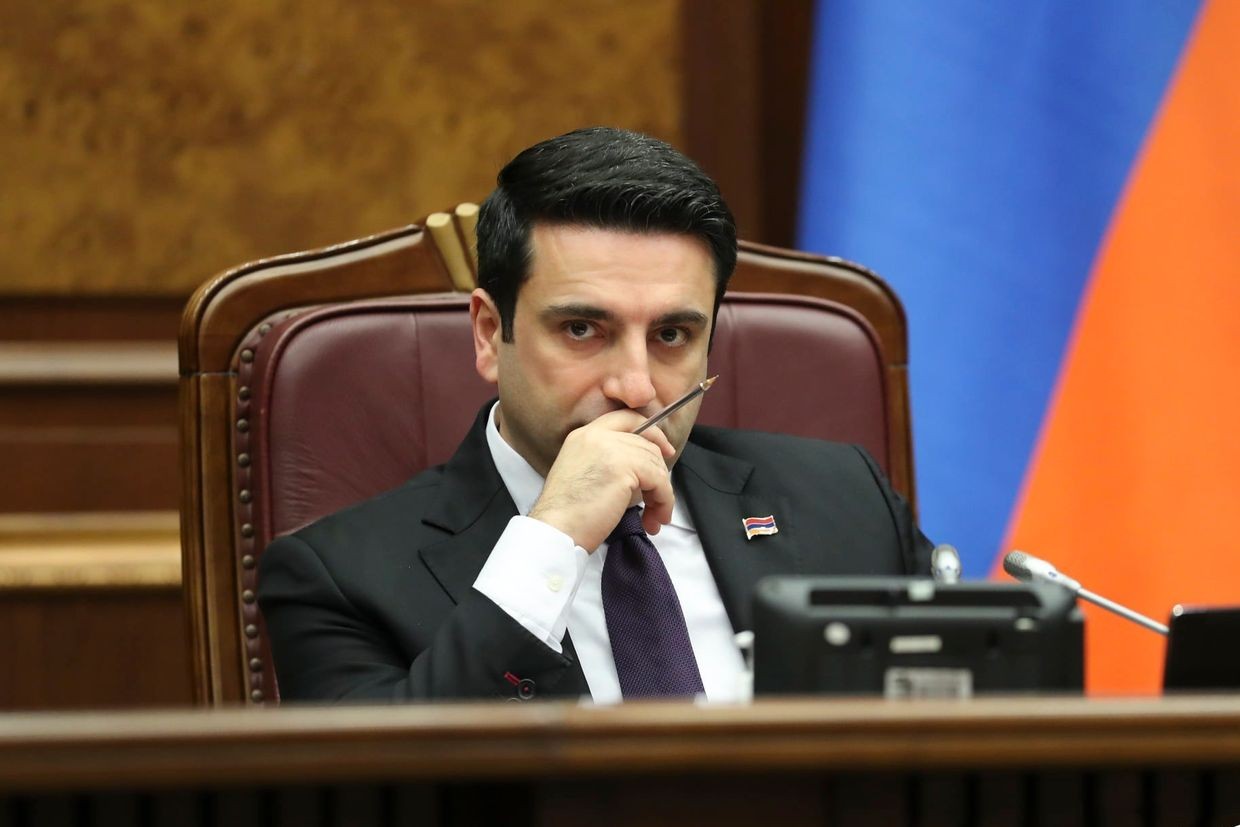Armenian parliamentary speaker blames Nagorno-Karabakh for not making political decision to fight back

On Monday, Parliamentary speaker Alen Simonyan blamed Nagorno-Karabakh Armenians for not fighting back during Azerbaijan's final offensive in September 2023 that followed a nine-month blockade.
The statement came in response to a journalist who introduced herself as a Nagorno-Karabakh Armenian and then asked Simonyan when she would be able to return home.
‘When it will be safe’, answered Simonyan, adding that such a time would be when a peace treaty would be signed with Azerbaijan.
‘You left [Nagorno-Karabakh] because it was not safe. Although you could have stayed and fought until the end, you left’, Simonyan said.
He suggested that it would have been possible to fight back ‘with those weapons’ that Armenia left and with the ‘political support’.
In response, the journalist asked a follow-up question, pressing Simonyan on if he thought Nagorno-Karabakh Armenian did not actually fight.
Simonyan said that ‘it is not right to make general statements about anyone, but I say it — one had to fight’.
‘What level of cynicism must the authorities have to, on the one hand, hand over Artsakh to the enemy and declare Armenia's non-interference, and on the other hand, brazenly accuse the people, who fought, were exhausted and literally left alone, of not fighting’, the former state minister of Nagorno-Karabakh Artak Beglaryan wrote on Facebook.
In response to Simonyan, MP Gegham Maunkyan from the opposition Armenia Alliance faction, reshared the list of the names of over 260 people who died during the September 2023 attack.
Later, facing criticism from opposition MPs, Simonyan spoke from the podium of the parliament and clarified his point, suggesting that his remarks referred to those who ‘called us and said, "we are leaving, we will not stay here any longer, we are leaving, open the border, we are leaving”’.
‘We acknowledge, there are people, there were people who are heroes and fought, and those heroes were from the diaspora, from Armenia, from Karabakh, but there were people in Karabakh, and there were people in Armenia who left and fled’, Simonyan said, concluding his speech by saying that ‘an empty country is defended by no soldier’.
Simonyan ‘humiliate[s] the heroic struggle’
The next day, Samvel Shahramanyan, the last president of Nagorno-Karabakh, demanded that Simonyan publicly apologise.
Shahramanyan condemned Simonyan’s statements, with which, Simonyan ‘tried to humiliate the heroic struggle of the people of Artsakh’ during the more than nine-month blockade and Azerbaijan's last offensive into the region in September 2023.

Shahramanyan insisted that Nagorno-Karabakh Armenians ‘did everything within their power to continue living in their historical homeland’, and additionally noted that the fight was not only on the battlefield.
‘But also on political and diplomatic fronts, at the forefront of which is Alen Simonyan, who at different times, based on political and other expediency, has changed his opinion and position on issues of utmost importance for Artsakh and Armenia’, the statement read.
Sharahamyan also urged Simonyan to name those who he claimed called from Nagorno-Karabakh asking to open the border.
Simonyan’s answer came shortly, during a briefing, during which he suggested that he made a political statement, and it was not about the people.
‘Who we are talking about, everyone understood very well’, Simonyan said. In turn, he directed a question to Shahramanyan, asking why he, unlike the previous leaders of the region, was able to leave Nagorno-Karabakh with his bodyguard.
‘The country should not have been emptied; it is a tragic thing. What I said does not evoke empathy, but what I said was right’, Simonyan said, again suggesting it could have been possible to stay and fight back if there had been ‘a political decision to keep Karabakh Armenian’
‘In the conditions of September 2023, staying and fighting in Artsakh would have ended with the same result, just with ten times more victims, including among the civilian population’, wrote Tigran Grigoryan, a political analyst originally from Nagorno-Karabakh.
‘Taking into account this undeniable reality, Alen Simonyan's statement can be understood: if you had stayed, you would have died, why did you come here to ask uncomfortable questions?’ Grigoryan wrote.











